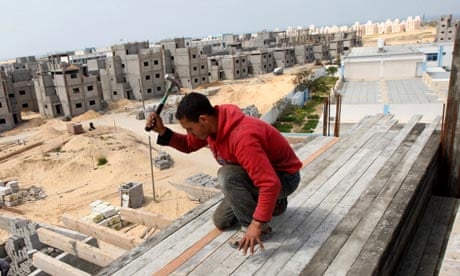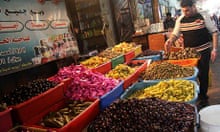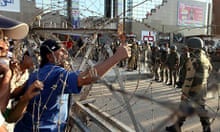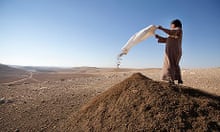These days, the economic health of any country relies on that of others - but the Palestinian Territories are exceptionally dependent on factors outside of them. On what do Palestinian economic fortunes rely on and how does the future look?
Israel
Israeli occupation in Palestinian territories, the barrier it has constructed along and within the West Bank as well as its land, air and sea blockades in the Gaza strip have placed severe limitations on the success of Palestinian economic policies.
A complex web of checkpoints and roadblocks make it difficult for Palestinians to travel within the Palestinian Territories for jobs, to bank or to trade. Farmers whose land is now behind the barrier are required to apply for 'visitor permits' which Israel regularly rejects - in Akkaba it approved 49% of applications in 2011, and just 20% by 2012. More recently, a report from the World Bank found that Israeli restrictions in the West Bank alone cost the Palestinian economy $3.4bn (£2.1bn) a year, or 35% of its GDP.
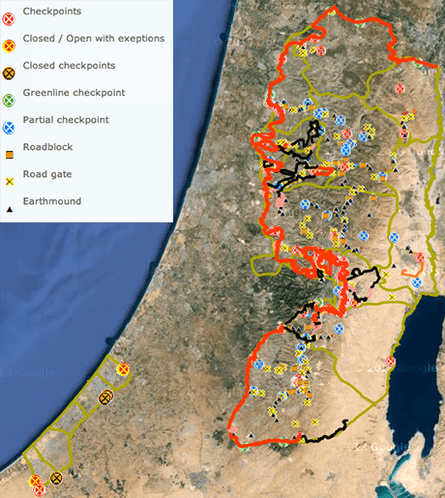
Israel's reach in the Palestinian Territories means it can exert enormous power over Palestinian livelihoods. Oxfam estimates that 800,000 olive trees have been uprooted by Israeli authorities since 1967. As a result, the 80,000 Palestinian families that the UN claims are economically reliant on the olive harvest lose $12.3m each year To show the impact of this, Visualizing Palestine showed what an area with one thirty-third the amount of trees - Central Park - would look like if it were destroyed.

Israel may have policies that hamper the Palestinian economy, but it is also a major source of Palestinian livelihoods. Unemployment is exceptionally high in the West Bank and the Gaza strip where almost 1 in 4 adults are jobless. According to the latest report from the International Labour Office, some 87,000 Palestinians aged over 15 (around 10% of all those with jobs) are employed in Israel and its settlements.
The majority of these Palestinians are employed in the construction sector, followed by manufacturing and agriculture - all of which tend to be characterised by insecurity. A survey by Palestine's main trade union found that only 11% of workers in Israeli settlements said they had job security, over half received less than the minimum wage and 65% had been exposed to toxic substances.
Palestinian authority
Corruption is rampant inside many of Palestine's institutions. In its latest report, the Coalition for Integrity and Accountability (part of the Transparency International Secretariat) produced a catalogue of corruption cases within Palestine's public bodies. In just over six months, the Corruption Crimes Court received 41 cases, which they say:
included embezzlement, money laundering, fraud, and exploitation of position for personal gain. Those involved in these crimes were high-level employees, such as heads of government divisions, who were conspiring with lower and intermediate level employees.
Pharmaceutical companies and their agents have also been accused of distributing expired food and medicine - though the risks of obtaining evidence on this means that often these crimes go unpunished.
In a 2012 opinion poll, 40% of Palestinians said they had used various forms of corruption to receive a certain public service. In 2011, 47 thousand traffic tickets had not been paid and tax evasion represented 40% of all tax revenues.
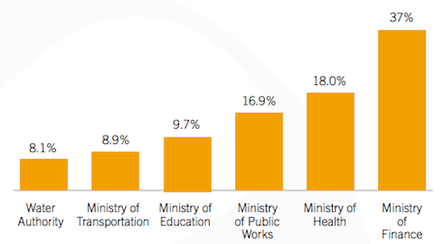
International aid
The Palestinian economy is dependent on international aid and around 4 in 5 Gazans rely on donations for their survival. As a result, when aid falls short of expectations and stated commitments as it did in 2012 (the Palestinian Authority received 80% of the US$1 billion it was expecting in direct budget support), the results are deeply felt. The decline in international aid is cited as one of the key reasons that the West Bank's GDP shrank in early 2013, for the first time in a decade.
In 2011, the single biggest donor to Palestine was the United States followed by the EU who gave $281m and $206m respectively.
Egypt
Israeli blockades mean that illegal activity is essential for Palestine's economic survival. Weapons, fuel, food, people and even vehicles regularly flow through the tunnels under the Gaza-Egypt border. But turbulence since the military takeover in Egypt has meant that these can no longer be relied upon to bolster the weak Palestinian economy. Gaza's deputy economy minister stated that economic activity had declined by around 80-90% since the ousting of the Muslim Brotherhood and the declining availability of basic produce has resulted in a sharp rise in prices.
Palestinian diaspora
The estimated one million Palestinians who have emigrated since 1948 (as well as their children) serve as a vital lifeline for Palestinians who remain in the West Bank and Gaza Strip. As a percentage of its GDP, the Palestinian territories are one of the most dependent economies in the world on remittances. The latest data from IMF in 2010 shows US$ 431m being transferred by workers employed abroad.
Get the numbers and get involved
Download the full spreadsheet
Contact us at data@theguardian.com
Follow us on Twitter
Mona Chalabi is teaching a Masterclass, Mastering spreadsheets: how to work with data, at the Guardian's London offices on 26-27 October. Learn more and book
